Stairway of Champions addition
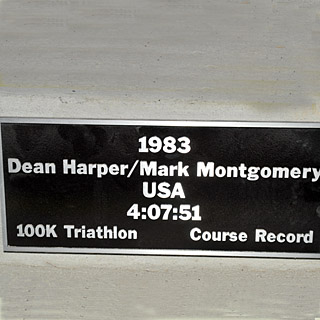
When Mark Montgomery brought his wife Ashlea and 9-month-old son Wyatt to camp out at the 30th anniversary of the Wildflower triathlon, the pioneering triathlon pro thought he would just do the mountain bike race and enjoy the scene with his new family. After all, Monty had a heart operation a few years back and that would be enough to celebrate a race he helped inaugurate back in 1983.
Ashlea heard about the new Wildflower Stairway of Champions that listed all the winners of the Wildflower long course triathlon. And she had heard Monty's story of how he had carved out a 10 minutes-plus lead on the bike in that first race back in 1983 – and how an unmarked turn a mile and a half into the run led him to run four extra miles. And how that left him crossing the finish line 8 minutes back. Her husband told her that the official winner Dean Harper acknowledged that he never passed Montgomery and Terry Davis had apologized to Montgomery and told him he would have won if not for the mistake. Monty' took his tough luck with a shrug and a wry acceptance of finality of the official results.
Arriving at race headquarters at Lake San Antonio earlier this week, Ashlea wanted to look at the Stairway of Champions, but Mark didn't share her enthusiasm. "Don't bother," said Montgomery. "There's nothing to see."
Nevertheless, Ashlea scrambled down the dirt embankment next to the bright shiny new steps that held the plaques that were scheduled to be introduced at a Friday ceremony. A moment later, she shouted: "Come down here! Come look!"
In a sport filled with many folks that would shrug off the injustice and the responsibility for a mismarked course, Terry Davis remembered what had transpired in that very first Wildflower. And so the 1983 Wildflower men's race winner plaque was inscribed with two names – Dean Harper, the winner in the record books, and Mark Montgomery, the man who surely would have won had that turn been clearly marked.
Montgomery, now a fit 56 years of age, told the rest of the story this morning after a pleasant swim in Lake San Antonio.
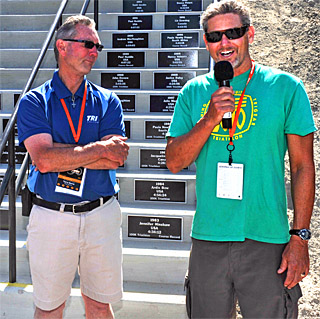
Slowtwitch: What was it like at that very first Wildflower long course race?
Mark Montgomery: That was the old shorter course — a mile swim, 50 mile bike, and 11 mile run. I came off the bike first, somewhere between 10 and 15 minutes ahead.
ST: What level pro were you?
Mark: I had been racing pro for 4 years. I did my first races in late '78 and I was at my peak at the time. And this was the first long distance money race. Everything else with prize money was a short race. So I drove my van up here by myself and camped out. It was a rainy, cold day — which was perfect. I love those days. The water was rough — Victory at Sea — perfect because I was a lifeguard. I got out of the water first and I just took off on the bike and never saw anybody. When I got off the bike and started running on that road by the lake here, several things had happened.
ST: What were those things that combined to make a perfect storm?
Mark: What I think happened is I finished the bike way sooner than anyone anticipated. And so the lead biker escort wasn't ready. They said they had some chalk markings on the course. But of course it was raining all day. So they either didn’t have 'em up, or the rain washed them all away. At any rate, where you turned off the paved road to where you go off road, there was no marking. I was running am all alone, so why would I turn off on a dirt road? If you're running on a paved road, you just assume you should keep following it. This was at mile 1.5. So I just continued running along the paved road. Finally at about Mile 2.0, a mountain biker and a car came charging up to me and the mountain biker said, "Hey Hey! You're off course!"
I screamed to them, 'You gotta be kidding me! Can you give me a ride back?'' They said 'No no! We can't! You have to run back.' So I said, "OK. Mark this spot! We're coming back here after the race and we're going to measure this.'
ST: So what happened next?
Mark: I ended up running 15 miles instead of 11. And so I told them, 'Just divide my time by 15. That will give you an average per mile. Take the minutes per mile time and multiply it by the regulation number of miles. And it wasn't even close. After making those calculations, I was 8 to 10 minutes ahead.
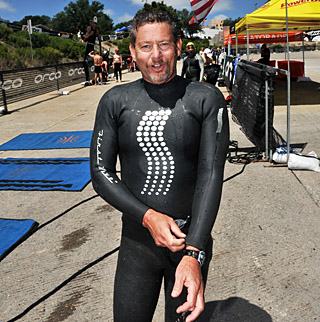
ST: What did Dean Harper say? And what did Terry Davis say?
Mark: I read an interview that Dean said, "I was never going to catch Mark.' But his wife was screaming bloody murder. So Terry and the race officials went into a meeting which took three hours.
ST: Were you there?
Mark: No. As far as I know, the competitors weren't allowed, in. Then when they came out, Terry was very apologetic. He said, 'I know you were going to win this race. But we just have to give it to the first guy to cross the line. And so that was that. And then he said: 'I feel so bad. All I can do, for the rest of your life, you will never have to pay for an entry at this race.' I was so angry, I told him 'I will never come back here again.': And of course I came back the next 20 years in a row. I think I made up for that prize money.
ST: You seem to have ended up good friends?
Mark: We buried the hatchet — and I came back the very next year and got 3rd. So, that was that. I always knew I won. Dean always knew I won. Even in his interview he said, "I know I never passed Mark. I knew he was way out there." It was kind of bittersweet.
ST: How do you feel when you see your name next to Dean Harper on the new Wildflower Stairway of Champions?
Mark: It's great. Because Terry has always acknowledged it verbally. But it was never in the results. It was never in the books. So yes, it was great to see that. To finally have that carved in stone, so to speak.
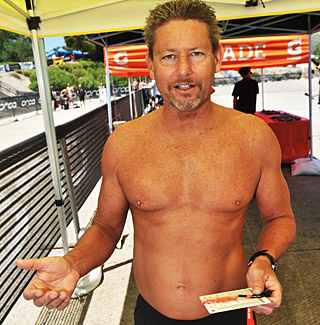
ST: Interestingly, you were there at the next famous Wildflower off course moment in 1993.
Mark: When the volunteer did not show up for the run turnaround. There was an aid station supposed to be there and there was stuff set up on the side of the road. But there were no cones set up there. There was a faint, old faded arrow from years before on the road. If you stood over it and stared at it you could see it. But not if you were running over it.
ST: What was that race like?
Mark: Nineteen ninety three was a special year because a lot of good new guys came. Andy Carlson from ITU, Peter Reid, Ricardo Gonzales, Ken Glah and Chuckie Velupek. I don’t think any of them had ever done the race before.
ST: How did that race develop?
Mark: I rode in the lead group until 10 miles to go and I took off. Andy [Carlson] and Pete [Reid] were out there the whole day. And with about 3 miles to go to transition, I caught up with Peter Reid. He was fried. In fact I don't think you see his name in the results. Somewhere way down. But he had already blown sky high. Andy was OK. He had a minute plus lead off the bike. Andy was a great runner and he went hard.
ST: How was Andy Carlson running before you all hit the missing turnaround cone at Mile 10?
Mark: He was excited and running away from us. By Mile 10 nobody was there. and Andy went down the hill first. The next guy there was [actually Andrew McNaughton] and then Tinley and Chuckie V, me, and Kenny Glah. At least the top 10 went past the turnaround point before the volunteer showed up. And all those except Tinley and McNaughton had never done Wildflower. So in my mind there was a possibility McNaughton and Tinley had turned around where they were supposed to. There is no way to know. I just saw them coming back. Kenny and I kept running together and I eventually figured out we were about half a mile past the turnaround and I finally convinced Kenny we had gone too far. So we turned around and came back up the hill. I had no idea exactly where it was. Ricardo Gonzalez ended up going to the bottom and running a loop around the parking lot and so he came to the transition the wrong way because of it.
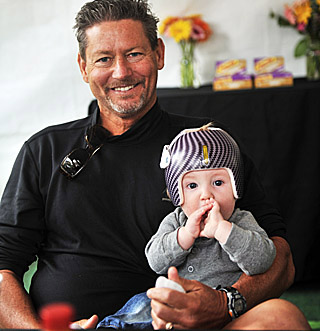
ST: What did you say to Terry Davis?
Mark: Afterwards, I talked to Terry. I told him this happened to me once when I was the owner of the Bonelli Park race series. I had to accept responsibility as the race director. First you figure out who went off course and where. Then you have the guys who actually got the place. Then you have the guy who maybe could have got the same place. You don’t try to guess within seconds. You just give both of them credit for the same place and you just double the prize money.
ST: What did Terry say when you explained what you did?
Mark: Terry being the guy he is, he says 'OK That's good.' To my knowledge, no one else has ever done that. You don’t see other guys doing that when all those pros go off one of their courses. To guys like that, it is just tough luck. You should have known the course.
ST: What happened in other races with screwed up course markings?
Mark: All those early years, we would make it right among ourselves. The three of us in front would get together and pool the money and split it. All the other race directors would never double it up. So it actually cost Terry an extra 5 or 6 or 7 thousand dollars. [Actually Davis paid an extra $15,000 to make it right with all the competitors] But with Terry everybody got a fair deal. No one went home complaining. People said, ''Oh yeah I went off course, but I got what I was supposed to get.' In those days, the only one who might have had a righteous gripe is Andy. I don't know if Terry made it up to him. [Actually, Terry Davis asked Andy Carlson where he would have finished and Carlson told Davis he would have finished 2nd. "And that's what I paid him," said Davis.]
* Note: Andrew McNaughton, who won the 1993 Wildflower, remembered it this way: "By the time I got to the 10 mile mark, I was 20 yards behind Andy. Sometime in the next half mile, I got on his shoulder and told him something was wrong and we should turn around. By the time we headed back, I think he was mentally discouraged and fell way back. I think it would have been hard to argue that he would have won – I was feeling very strong at that point. But we will never know if he could have hung on if we had turned around at the 10 mile mark."


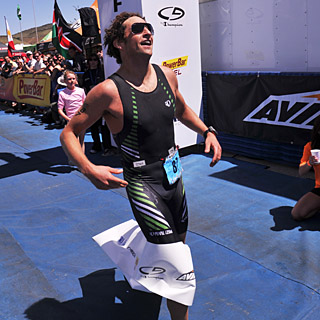
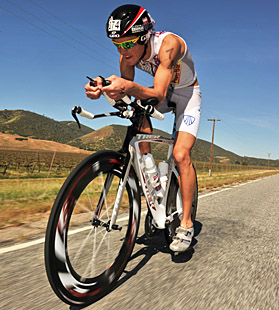
Start the discussion at slowtwitch.northend.network